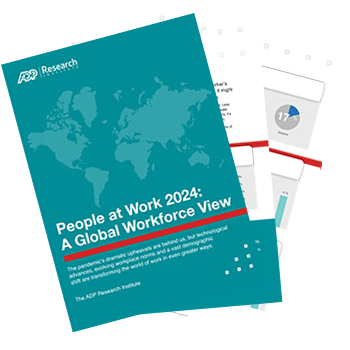
People at Work: A Global Workforce View
For the past four years, ADP Research has surveyed workers around the globe to learn about their on-the-job experiences. This work has illuminated the world’s journey through a deep economic downturn, the subsequent cost-of-living crisis and monumental change tied to remote and hybrid work. As we’ve passed each of these milestones, People at Work has captured how the global labour force has adapted and changed. The world is shaking off its pandemic-driven upheaval, but change hasn’t slowed. As new opportunities and challenges reshape the labour market, workers in some ways have remained constant in their priorities—they still put great value on remuneration and job security, for example. But in other ways, they feel under threat from technology, stress and shifting workplace norms.
Using detailed survey responses from more than 34,000 workers in 18 countries, People at Work continues to capture this evolution. In 2024, we uncovered six key themes.
People at Work 2024: A Global Workforce View
Country highlights
France
Many respondents in France give their employers low marks on their climate efforts. They’re dissatisfied with progress on carbon emissions (18%, the biggest share globally), water pollution (18%, second only to Argentina), and energy efficiency (20%, the biggest share of any country). They also have personal concerns, with 43% saying their work is suffering due to poor mental health. That’s the biggest share in Europe and one of the biggest in the world (India is at 48%). More than half of workers say they’re underpaid for the work they do (second only to Argentina at 53%). And an even bigger share, 67%, say their pay cheques are regularly short (compared to 50% for Europe and 40% globally).
Germany
In Germany, only 16% of workers agree with the statement, “I don’t feel secure in my job,” a small share that ties with China. Yet many workers (27%) lack confidence that they have the skills necessary to advance their careers (compared to Europe at 20% and globally at 18%). Only 28% say their employer invests in skills needed for them to advance, the smallest share in Europe. So it’s no wonder Germans are stressed. Only 5% say they never feel stress on the job, the smallest share of any country.
The Netherlands
Enjoyment on the job is a prized attribute in the Netherlands, with 60% of respondents valuing the enjoyment of a day’s work. No other country comes close (Japan is 50% and Germany 48%). Not only do workers in the Netherlands value enjoyment at work, 80% are extremely satisfied with it. In fact, the Netherlands might have the most satisfied labour force in the world. Large numbers of people report satisfaction with job security (86%), and they’re second only to India in salary satisfaction (70%). In Europe, the Netherlands leads in every category of satisfaction. People feel recognised for their work and consider themselves fairly paid.
Poland
Workers everywhere give high priority to salary, but the share in Poland who value it (68%) is larger than in any other European country and the third largest globally, behind Singapore (71%) and Argentina (70%). That might be why workers in Poland put in the smallest amount of unpaid overtime on the continent: about five hours, compared to nearly seven for Europe. Last year, workers in Poland received the region’s highest annual pay rise (5% to Europe’s 3%). This year, most (56%) are expecting another one.
Spain
Salary is prized by 63% of workers in Spain. That’s a healthy number (it’s 61% in Europe), but what really sets Spain apart is job security, which 42% of workers value compared to 35% regionally. Workers in Spain are less likely to feel like they’re paid fairly (49%) compared to Europe as a whole (52%) and globally (66%). In fact, less than half (48%) say they’re paid fairly for what they do. And nearly half (47%) are obliged to work from the office or job site every day (it’s 41% in Europe and 28% globally).
Switzerland
Workers in Switzerland put in the highest amount of unpaid overtime in Europe—9.2 hours per week (the average is 6.8 hours in Europe). Still, they have the smallest share of workers who feel underpaid (44%). Many workers in Switzerland (27%) say they enjoy great flexibility on the job, and this small country has the smallest share of workers who are required to show up at the workplace every day (31% compared to 41% for Europe). But if workers, for some reason, want to leave Switzerland, 43% of them think it would be possible to relocate overseas and stay with their existing company.
United Kingdom
Compared to their counterparts across Europe, more workers in the UK think they’re paid fairly for their role (58%) and their skill set (57%), but both numbers fall far short of the global averages (66% and 65% respectively). And 15% of workers in the UK are unhappy with their enjoyment on the job, the largest share of any country in Europe and second only to Japan (19%).
Italy
Workers in Italy have a gripe about something interesting: their job titles. More than 16% of workers say they’re dissatisfied with their titles, the largest group of any country. Globally, only 7% of workers have the same complaint; in Europe the share is about 10%. In fact, workers in Italy are unhappy about a lot of things. Much like the peninsula itself, Italy in our survey is an outlier, with large blocks of workers expressing negative sentiment on a number of subjects. Both regionally and globally, Italy leads on dissatisfaction at work. Economic growth is steady in this Mediterranean nation, but public debt as a percentage of GDP is high and rising. Among OECD countries, Italy has one of the lowest growth rates and highest rates of public debt. A privatisation effort is ongoing. Inflation is easing but remains elevated.
Articles

insight
Revealed: the factors that influence employees’ flexible working options

insight
ADP’s research results: we need to talk about men at work
Europe by the numbers
Discover all our studies
People at Work: A Global Workforce View
One of the largest international studies of its kind, canvassing the views of over 34,000 workers in 18 countries, our research provides HR leaders with unique insights into the employee experience — people’s attitudes, aspirations, wants and needs.

People at Work 2023
Discover insights to better understand, motivate and retain your people.
People at Work 2023
Discover insights to better understand, motivate and retain your people.

People at Work 2022
Discover key insights to stay competitive and motivate your employees.
People at Work 2022
Discover key insights to stay competitive and motivate your employees.

People at Work 2021
Discover global worker insights a year on from the start of COVID-19.
People at Work 2021
Discover global worker insights a year on from the start of COVID-19.
Get Started
By submitting this form you are informed that ADP may contact you about its products, services, and offers, according to our Privacy statement for Business contacts.
Get your report now - discover key insights to better understand your workforce and transform your business.

 1. What workers want: pay—and more
1. What workers want: pay—and more
 2. What workers expect: pay increases
2. What workers expect: pay increases
 3. The promise and peril of remote work
3. The promise and peril of remote work
 4. ESG and DEI: a workforce divided
4. ESG and DEI: a workforce divided
 5. Career development: room for improvement
5. Career development: room for improvement
 6. Stress, the constant companion
6. Stress, the constant companion






